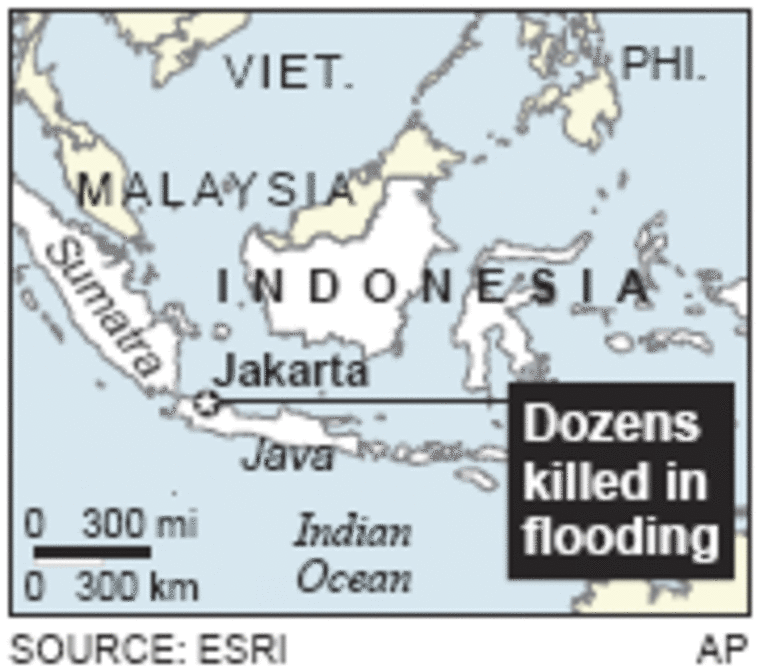Deadly floods receded from much of the Indonesian capital Wednesday, leaving stinking debris blocking streets and a daunting cleanup for residents, many angry at the country’s leaders following the latest in a string of disasters.
“Every year the government promises there will be no more floods, but just look around you,” said Endang Trisilowati as her children hauled sacks of black mud out of her house in downtown Jakarta. “I have to buy a new sofa, new beds, everything. It is a disgrace.”
Officials said the floods had receded completely in more than half the affected areas. But elsewhere, filthy waters were still six feet deep, shutting factories, shops and schools and cutting off electricity.
Rival government agencies gave the number of homeless as between 240,000 and 420,000. It was not clear how quickly those numbers were being updated as people returned home.
Emergency shelters at mosques and schools mostly remained full, with doctors treating long lines of people complaining of diarrhea, respiratory problems and skin diseases.
The death toll was at least 50, mostly from drowning or electrocution, the Health Ministry said.
More flooding could come
Authorities warned that more rain over the city or the largely deforested hills to the south could trigger renewed flooding.
“In general, the water is continuing to recede further and many people are returning home,” said Jakarta city spokesman Arie Budhiman. “I would like to say that the worst has passed us, but the weather can’t be predicted.”
As homeowners washed walls and hung curtains to dry, backhoes were deployed to shift piles of soggy mattresses, chairs and a thick layer of sludge from highways that had been underwater since Feb. 1, when the floods struck.

“The water is all gone, but the smell is awful,” Fifa, an 18-year-old woman, said as she removed bits of wood and other rubbish from her house in downtown Jakarta. “At least we can get back to normal now.”
Indonesia is no stranger to disasters, both natural and manmade.
It lost more than 160,000 people to the 2004 Asian tsunami. Since then, the poor nation has been struck by bombings and two deadly earthquakes. In December, more than 400 people died in a ferry sinking, while on New Year’s Day, a jetliner crashed into the sea, killing all 102 people aboard.
The worst floods in recent memory to hit Jakarta were triggered by two days of seasonal rains, which caused the rivers and canals that crisscross the low-lying city to burst their banks, inundating rich and poor areas alike.
'Every year we suffer a flooding'
Government ministers have acknowledged that bad drainage, building shopping malls in water catchment areas and cutting down trees in the hills south of the city all contributed to the problem.
“I sometimes think that we do not have government at all. Every year we suffer a flooding,” said Dayu Setyianing, a mother of two who has slept in a cemetery since her house was submerged. “They talk a lot, but nothing ever happens.”
Foreign countries donated money and aid agencies distributed soap, towels and hygiene kits, even as the Indonesian government said it would not make a formal request for international aid.
The European Commission pledged $775,000, the United States gave $100,000 and the Netherlands — Indonesia’s former colonial ruler — offered $1.3 million for relief efforts.